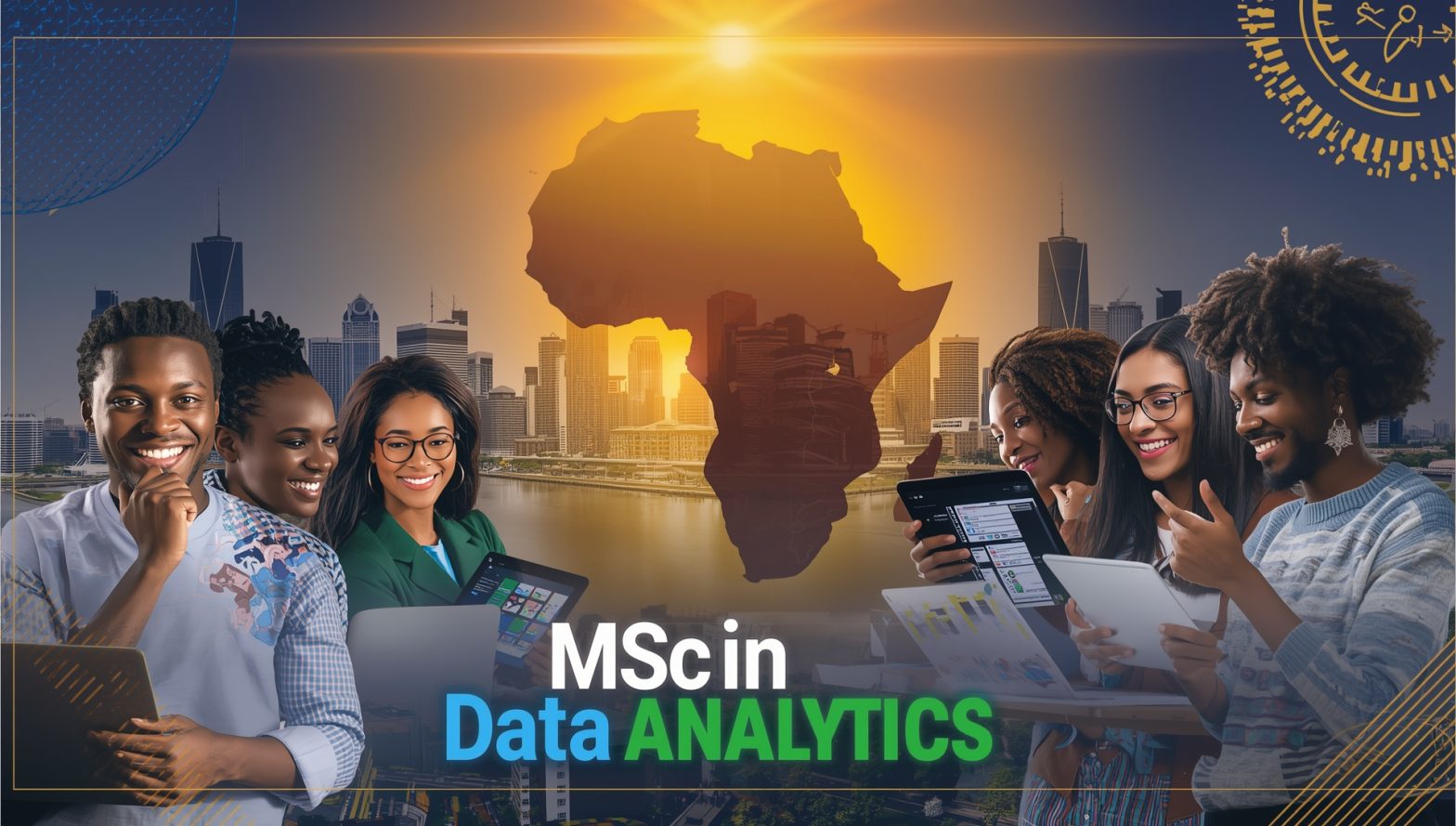Zambia stands at a fascinating crossroads. As one of Southern Africa’s most promising and strategically positioned economies, the country holds immense potential. Yet it continues to grapple with challenges that touch nearly every aspect of development. High unemployment, sluggish industrial growth, and barriers in trade diversification and global competitiveness persist. Many of Zambia’s obstacles stem from a common root: the need for leaders who can think globally while acting locally. This is where a Master’s in International Business is more than an academic qualification. For Zambia’s emerging professionals, policymakers, entrepreneurs, and future industry leaders, this degree creates a strong foundation. It helps them navigate complex markets, design modern solutions, and unlock opportunities beyond national borders. At a time when Zambia seeks sustainable growth, economic resilience, and deeper global integration, international business expertise becomes a catalyst for change — and a transformative tool for those who hope to contribute meaningfully to the country’s progress. Why international business education matters for Zambia’s development Zambia’s development challenges are deeply interconnected. Issues such as limited export diversification, uneven foreign investment, and dependence on a narrow set of economic sectors require solutions set in the global context. A Master’s in International Business provides that context. It exposes students to global trade dynamics, cross-border operations, international marketing strategies, leadership practices, and the economic forces shaping today’s world. While local knowledge remains essential, Zambia’s current growth trajectory demands a broader lens—one that understands global competition, identifies new international opportunities, and builds the capacity to position Zambian industries in wider markets. International business training fills that gap. Graduates with this expertise are prepared for strategic, evidence-based decisions. They know how to attract foreign investment, expand globally, and foster innovation through international best practices. How a Master’s in International Business builds leaders for Zambia’s future A Master’s in International Business offers a series of transformative advantages that directly align with Zambia’s economic needs. Students develop a strong understanding of market entry strategies, financial systems, international law, global supply chains, and cross-cultural negotiation. These skills help professionals contribute meaningfully across government institutions, the private sector, and development organisations. The degree also encourages an analytical mindset. Graduates learn to evaluate risks, study international trends, and anticipate global shifts that may affect Zambia’s economy. They become more capable of designing policies that encourage investment, support businesses seeking to scale internationally, and identify opportunities in sectors such as agriculture, energy, mining, tourism, logistics, and technology. Perhaps the most important outcome is leadership. An international business programme trains individuals to lead teams, manage resources, and communicate clearly across diverse settings. Zambia’s economic evolution depends on strong leadership — not just technically skilled individuals, but people who can inspire innovation and create structures that support long-term development. Where international business skills make the biggest difference in Zambia Although international business expertise is valuable across every sector, its impact is particularly significant in key areas of Zambia’s economy. Trade diversification and export expansion Zambia has long relied on copper as its main export. While the mineral remains essential, the country risks economic vulnerability without broader diversification. International business education helps professionals identify new export opportunities in agriculture, manufacturing, textiles, food processing, honey production, tourism experiences, and emerging technology-based services. Students learn how products can be positioned for international markets, how to navigate trade barriers, and how global distribution channels operate. This knowledge strengthens Zambia’s ability to compete regionally and globally. Foreign investment and economic partnerships Attracting foreign investment remains vital for Zambia’s infrastructure and industrial development. Graduates with international business training understand investor relations. They know what global companies look for when selecting markets. They also see how economic environments can be shaped to encourage long-term investment.y can help build policies that support stable, transparent, investor-friendly conditions — something every emerging economy needs. Entrepreneurship with a global vision International business education empowers Zambian entrepreneurs to build globally competitive ventures, scale regionally, form international partnerships, and align products with global trends. This shift from local thinking to global opportunity allows Zambian entrepreneurs to participate more actively in regional trade and global supply chains. Stronger public-sector decision-making Public institutions play a vital role in shaping Zambia’s economic direction. When policymakers, ministry officials, and development planners understand international markets, they can create effective regulations, negotiate regional agreements, and support industries more strategically. A Master’s in International Business helps public-sector leaders understand: This knowledge equips them to design policies that open new doors for Zambia’s economy. Modern solutions for modern challenges Many of Zambia’s challenges cannot be solved solely through traditional approaches. They require new thinking and modern tools that align with the dynamics of a globalised world. A Master’s in International Business supports this shift by equipping graduates with skills such as: These competencies allow professionals to tackle challenges with greater precision, whether they involve strengthening local manufacturing, expanding trade networks, improving tourism experiences, or designing innovative financial services. Graduates also learn to analyse international case studies — a feature that helps them identify proven solutions from other regions and adapt them thoughtfully to Zambia’s context. When ideas travel, opportunities multiply. Why a degree matters deeply in today’s global economy Zambia is increasingly connected to global systems. Regional trade agreements, foreign investment flows, global supply chains, and digital commerce all influence the country’s economic path. Without strong international business expertise within its workforce, Zambia risks missing opportunities that could accelerate growth. A Master’s in International Business equips professionals to navigate these systems confidently, analyze competition, understand market pressures, and collaborate across borders. It builds resilience to adapt swiftly to shifting global conditions. In other words, the degree prepares individuals to lead with insight rather than reaction, positioning Zambia to participate more effectively in global economic conversations. The ripple effect on Zambia’s long-term progress International business graduates don’t just contribute to individual organisations. They strengthen the overall economic ecosystem. When businesses operate more strategically, governments negotiate more effectively, and entrepreneurs build globally competitive companies, the effects spread across industries and communities. Stronger leaders mean stronger institutions. More capable organisations… Continue reading Want to Solve Zambia’s Biggest Challenges? Start With a Master’s in International Business
Author: admin
Data is the New Gold: How an MSc in Data Analytics Unlocks Africa’s Potential
There is a powerful shift happening across Africa — a shift that’s not driven by minerals, oil, or traditional exports, but by something more abundant, renewable, and transformative. That resource is data. From mobile transactions and satellite imagery to digital health records and online consumer behaviour, Africa is now generating unprecedented volumes of information. What remains scarce, however, is the talent capable of turning that information into intelligent action. This is where the value of a Master of Science in Data Analytics becomes deeply relevant. For a continent aiming to leapfrog into a more connected, innovative, and knowledge-driven future, data skills are no longer optional. They are foundational. And for young Africans seeking meaningful careers, this field represents one of the most exciting, impactful paths available today. The growing influence of data across Africa Africa’s data landscape is unique in the best possible way. The rise of mobile connectivity, digital banking, e-commerce, and online education has created an environment where more data is generated per user than ever before. In many African countries, mobile money adoption far exceeds that of traditional banking. Transportation apps, telemedicine platforms, and agritech solutions also contribute to a growing digital footprint. Despite this exponential growth, much of the data remains under-analysed. Organisations collect it but struggle to make sense of it. Governments sit on massive data repositories but lack analytical systems. Small businesses don’t yet know how data can sharpen their decision-making. This gap between data generation and data utilisation creates one of the most promising opportunities for the continent’s workforce. An MSc in Data Analytics bridges that gap by developing talent capable of interpreting patterns, telling stories through numbers, and supporting meaningful decisions. How an MSc in Data Analytics becomes a catalyst for African innovation A strong data analytics programme builds more than technical ability. It creates a mindset — one that embraces curiosity, problem-solving, and experimentation. Across Africa, these qualities matter because industries are changing fast, and traditional solutions often don’t scale. Students gain exposure to tools like machine learning, predictive modelling, cloud analytics, and data visualisation. More importantly, they learn how to apply these skills in contexts that matter most to Africa. A well-designed MSc also encourages hands-on practice, including: This practical approach ensures that graduates step into the workforce ready to solve problems immediately. The sectors where data can truly transform Africa While data touches every industry, there are a few areas where its impact in Africa becomes especially powerful. Agriculture and food systems Agriculture employs a significant portion of Africa’s population, yet unpredictable weather patterns, limited market access, and fragmented supply chains often limit productivity. Data analytics can support farmers through: A data-driven agricultural system can dramatically increase food security and empower smallholder farmers. Fintech and financial inclusion Africa’s fintech ecosystem is one of the fastest-growing in the world. Mobile money platforms have already revolutionised financial access, and analytics adds another layer of innovation by enabling: The more data-driven these systems become, the more inclusive the continent’s financial landscape grows. Healthcare optimisation Healthcare data has tremendous value — not only for treating patients but for predicting disease trends, distributing resources, and improving public health campaigns.Analytics in healthcare helps with: Countries that adopt strong data systems can respond faster to health crises and build more resilient healthcare structures. Urbanisation and smart cities Africa’s cities are expanding rapidly, often faster than infrastructure can keep up. Analytics helps governments and planners understand how people move, how energy is consumed, where congestion appears, and what services are needed most.Things like transportation planning, waste management, street lighting, and digital identity systems all benefit from accurate data. Why African professionals benefit strongly from an MSc in Data Analytics For African professionals, an MSc in Data Analytics offers more than advanced training — it opens doors to opportunity across multiple industries. The degree reshapes the way individuals approach problem-solving, encouraging them to move beyond assumptions and base decisions on clear, reliable evidence. In a region where many sectors are evolving rapidly, this shift in mindset can influence entire industries and bring clarity to decision-making processes that previously relied on intuition or incomplete information. One of the most appealing aspects of the degree is its versatility. A graduate can build a career in banking, agriculture, telecommunications, government agencies, development organisations, or rapidly growing innovation hubs. These fields all generate significant amounts of data and desperately need professionals who can transform information into insight. This wide range of possibilities means that careers can evolve along with the continent’s growth, allowing professionals to explore roles that combine technology, strategy, and impact in meaningful ways. Choosing a programme that fits Africa’s context Selecting the right programme plays a major role in shaping the quality of the learning experience. African students benefit most from programmes that balance theoretical depth with real-world applicability. A strong MSc in Data Analytics should offer opportunities to work with datasets from African markets, include projects grounded in local industries, and provide specialisation options that reflect emerging challenges on the continent. Flexibility also matters, especially for working professionals. Programmes that offer online or hybrid learning modes make it easier to balance studies with other responsibilities. A strong foundation in ethics and data governance is equally important. Africa’s data ecosystem has unique characteristics, such as linguistic diversity, inconsistent data structures, and varied record-keeping systems. Some datasets may be incomplete, unlabelled, or collected under differing standards. A programme that acknowledges these complexities produces graduates who are better prepared for the realities of regional data work. Turning knowledge into impact Completing an MSc in Data Analytics marks the beginning of the journey rather than the end. The true value of the degree appears when graduates start applying their skills in real situations. Africa’s most successful data professionals are those who combine technical ability with thoughtful interpretation, exploring the story behind the numbers rather than focusing solely on the calculations. They become problem solvers who identify patterns others overlook, uncover opportunities hidden within complex datasets, and communicate insights in ways that… Continue reading Data is the New Gold: How an MSc in Data Analytics Unlocks Africa’s Potential
The Smartest Move for a Young Rwandan: Building a Career in Data Analytics
Across Rwanda, a powerful shift is unfolding as more organisations turn to digital tools to inform decisions, enhance operations, and better understand the communities they serve. At the heart of this transformation is data — information collected from mobile money transactions, e-government services, online behaviour, business performance, and everyday digital activity. However, data becomes valuable only when it can be interpreted with clarity. For many young Rwandans deciding on a future career path, this is exactly where the opportunity lies. In a rapidly evolving job market, data analytics has become one of the most promising and strategic fields to pursue. Whether the goal is to apply for one of the growing data analytics jobs in Rwanda, qualify for entry-level data analyst positions, or simply understand how to become a data analyst, this path is becoming more accessible, more rewarding, and more essential every year. The new reality shaping Rwanda’s job market Rwanda’s rapid digital development has created a fertile ground for data-driven careers. The country’s investment in ICT infrastructure, digital literacy, innovation hubs, and tech-focused academic programs has generated an environment where organizations of all sizes rely on information to guide their decisions. Every transaction, service interaction, or digital touchpoint produces insights waiting to be discovered. Businesses, government bodies, NGOs, healthcare institutions, and startups are increasingly relying on analysts to effectively understand and respond to this information. This rising demand makes data analytics one of the most valuable and future-ready pathways for young professionals entering the workforce. A skillset that speaks the language of modern organisations A data analyst turns raw information into meaningful insights. Their responsibilities are a blend of investigation, problem-solving, and communication. While technical tools are part of the job, the core skill is making sense of trends and presenting them in a clear and concise manner. Most data analysts: These tasks appear technical on the surface, but they are fundamentally human. Analysts help people make better decisions — whether it’s a business adjusting its strategy or a community organisation evaluating its impact. The expanding market for data analytics jobs in Rwanda Over the past decade, Rwanda has positioned itself as a forward-looking digital hub. This ambition has fuelled demand for data talent across a wide range of industries. Banking and fintech With the rise of digital payments and mobile money ecosystems, banks and fintech companies are increasingly seeking analysts who can understand transaction patterns, detect risks, and support product development. Healthcare and public services Government institutions and NGOs rely heavily on data to guide policy, measure programme results, and optimise public services. Analysts help organisations understand whether their interventions are working and where improvements are needed. Technology, telecommunications, and digital platforms As more Rwandans adopt digital services, telecom companies and tech firms need analysts to track network performance, user behaviour, and service quality. Retail, logistics, agriculture, and education Digital transformation is touching every sector. Retailers use analytics to understand buying behaviour, logistics companies optimise routes and operational costs, farmers rely on digital tools to improve crop yields, and schools monitor student performance data. This wide demand means that young Rwandans are not confined to a single industry. The field offers flexibility, mobility, and a chance to contribute to the country’s digital vision. A clear and achievable path into the profession Many young Rwandans already engage with technology in their daily lives. This familiarity gives them a natural advantage when transitioning to a data-focused career. The skills required are increasingly accessible through online courses, local bootcamps, community learning programmes, and self-guided practice. Another reason this field suits young professionals well is the mindset it demands — one that fosters curiosity, problem-solving, patience, and a willingness to continue learning. Rwanda’s culture of innovation aligns strongly with these qualities, enabling young people to confidently grow into this career path. How to become a data analyst in Rwanda There is no single route into this field, and that is one of its biggest strengths. Young people can begin from different academic backgrounds and still succeed with the right combination of skills and practice. Building essential technical foundations The most important tools to start with include: These tools are available through free or affordable online platforms. Mastery takes practice rather than expensive qualifications, making the field highly accessible. Developing analytical and communication skills A great analyst not only observes patterns but also explains them clearly. This includes describing what the trends mean, why they matter, and how they should guide decisions. Strong communication skills — in writing and speaking — separate a good analyst from a great one. Working with real datasets Hands-on experience is essential. Young analysts can practise using open government datasets, Kaggle competitions, sample business cases, and personal projects. Realistic datasets build confidence in interpreting complex information. Applying for entry-level roles The country now offers more opportunities for entry-level data analyst positions. These tasks may include updating dashboards, cleaning data, supporting research teams, or assisting senior analysts. Even internships, volunteer placements, or temporary projects can serve as strong entry points into the field. Creating a portfolio A portfolio helps prove capability. It may include: A strong portfolio often matters more than years of experience. The mindset that shapes long-term success Data analytics is not a “one-and-done” field. It evolves. Tools change, best practices shift, and industries adopt new approaches. The most successful analysts embrace continuous learning. Young Rwandans who approach the field with curiosity, consistency, and a willingness to grow will find themselves ahead of the curve. Confidence builds over time, and every new tool or project strengthens expertise. The field rewards persistence far more than perfection. Opportunities for growth beyond entry level Once a young analyst gains experience, multiple paths open. These include: As Rwanda expands its digital infrastructure, leadership roles in analytics will become even more important. Young people entering the field now are well positioned to lead future teams, guide policy decisions, and shape the country’s next stage of digital development. How does this career benefit young people personally Beyond career stability, data analytics… Continue reading The Smartest Move for a Young Rwandan: Building a Career in Data Analytics
From Graduate to Data-Driven Leader: Your Kenyan Career Starts Here
Graduation marks the beginning of a new chapter, a moment filled with both excitement and uncertainty. For many young professionals in Kenya, the real question after university is no longer what did I study? But how can I make an impact in today’s digital economy? Across industries, data has become the engine of progress. From fintech startups in Nairobi to multinational NGOs, organisations now depend on analytics to make informed, efficient, and innovative decisions. This growing dependence creates numerous opportunities for graduates who can transform numbers into compelling narratives. To lead with insight, not instinct, now is the time for Kenyan graduates to chart a direct course from graduation to data-driven leadership. Why Kenya’s data landscape is opening new doors Kenya is one of Africa’s most dynamic and connected economies. The rise of mobile banking, digital trade, and smart infrastructure has fuelled an urgent need for professionals who can manage and interpret data effectively. Today, graduate jobs in Kenya go far beyond traditional IT roles. Positions such as junior data analyst, data operations assistant, and business intelligence associate now appear across nearly every sector. Banking, retail, healthcare, agriculture, and logistics are all hiring graduates who can convert raw information into actionable insights. This shift isn’t temporary — it represents Kenya’s long-term transformation into a knowledge-based economy. In this new environment, understanding data is not a niche skill; it’s a core professional advantage. What it really means to be a data-driven leader Being “data-driven” goes beyond spreadsheets and dashboards. It’s about leading with evidence, encouraging curiosity, and translating data into decisions that move an organisation forward. A data-driven leader does three things consistently: In Kenya’s fast-evolving business landscape, this mindset transforms data professionals from behind-the-scenes analysts into strategic partners. Mapping the career path of data analytics in Kenya Every successful data leader begins by starting small, building practical experience before transitioning into strategic roles. The journey often follows four natural stages. Step 1: Entry-level foundations Graduates typically begin as junior data analysts, research assistants, or data clerks. These positions focus on data collection, validation, and basic reporting — vital for learning how information flows within an organisation. Step 2: Analyst or specialist roles After gaining hands-on experience, many professionals progress to mid-level roles such as business intelligence analyst or data specialist. The focus shifts from compiling reports to delivering insights that guide decisions, budgets, and performance improvements. Step 3: Data-driven leadership With several years of experience, you may step into positions such as analytics manager or data strategy lead. Here, leadership means aligning analytics with business goals, mentoring junior analysts, and influencing high-level strategies. Step 4: Strategic leadership and influence Eventually, seasoned professionals take on roles such as Head of Data or Chief Data Officer. These executives shape company-wide strategies, ensure the ethical use of data, and champion innovation through the effective use of information. This step-by-step growth — from data handling to decision-making — defines the modern career path data analytics in Kenya offers. The core skills needed for data leadership in Kenya In Kenya’s competitive job market, great data leaders master a balance between technical ability, business awareness, and human connection. Employers seek professionals who can interpret information, convey a story through numbers, and influence others through clear communication. Technical and analytical skills form the backbone of this field. Proficiency in tools such as Excel, SQL, Python, Power BI, and Tableau allows you to clean data, identify trends, and create meaningful visualisations. Beyond these tools, understanding data privacy, ethics, and governance is essential, as Kenyan organisations increasingly emphasise responsible data practices. However, true leadership depends on more than technical skill. Business understanding gives data context. Whether analyzing customer behavior in retail or assessing financial risk in banking, the best professionals understand how data directly connects to real-world outcomes. This ability to link insight to action makes data valuable. Equally important is communication and storytelling. The most effective data leaders transform statistics into compelling stories that inspire informed decisions. A well-designed dashboard or concise presentation can help executives see what numbers alone cannot. Finally, adaptability separates lasting leaders from short-term analysts. Kenya’s digital ecosystem is changing rapidly, and successful professionals are embracing new tools, automation, and AI technologies with confidence. They lead teams through transformation, not by knowing everything, but by being willing to learn continuously. Gaining practical experience in Kenya For many graduates, the biggest challenge is translating academic knowledge into professional value. Fortunately, Kenya’s expanding digital sector offers numerous opportunities to gain real-world experience. Internships and graduate programmes are ideal starting points. Roles in analytics, research, or operations help develop problem-solving skills and familiarity with real business data. Even volunteering for small organisations or NGOs can provide exposure to reporting and analysis tasks. If formal opportunities are limited, create your own. Kenya’s Open Data Initiative provides free public datasets — from health to agriculture — that can be used to build dashboards or small projects. Uploading your work to platforms like GitHub or LinkedIn demonstrates initiative and skill to potential employers. Short, industry-recognised courses can also accelerate progress. Many online and local training providers now offer data analytics programmes that blend technical learning with mentorship and project-based experience. Enrolling in such courses helps bridge the gap between theory and real-world practice — a key step for graduates entering analytics roles. Overcoming Kenya’s data job market challenges While the data field is growing, competition is strong, and breaking in requires persistence. New graduates often encounter three main challenges: The key is consistency. Even small projects or case studies, when presented clearly, can demonstrate readiness and problem-solving ability. Why Kenya is ideal for data-driven careers Kenya’s economy is embracing innovation at every level. National initiatives, such as Vision 2030 and developments like Konza Technopolis, demonstrate a commitment to building a data-enabled society. This progress is not limited to major cities. Across counties, organisations in healthcare, education, and agriculture are investing in data systems to improve services and outcomes. As a result, professionals who understand analytics are not just in… Continue reading From Graduate to Data-Driven Leader: Your Kenyan Career Starts Here
More Than a Degree: Why Data Analytics is the choice in Rwanda
I remember standing on the terrace of a building in Kacyiru a few months ago, looking out over Kigali as the sun went down. The city lights were just starting to twinkle on the hills. It’s a view that always gets me. It doesn’t just look beautiful; it looks like ambition. You can feel it here, can’t you? From the buzzing start-up hubs in Norrsken House to the relentless pace of construction across the city. Rwanda isn’t just developing; it’s sprinting. We don’t want to just catch up with the rest of the world; we want to leapfrog it. But there’s a conversation I keep having with bright, ambitious young people here, and it always ends the same way. They have the degree. They went to university, they wore the gown, they made their parents proud. But now they’re stuck in a job that doesn’t stretch them, or worse, they’re struggling to find one at all. They did everything “right,” but the old keys don’t seem to fit the new locks that Rwanda is building. In a country that is betting its entire future on becoming a knowledge economy, a standard degree is no longer enough. We need a new set of tools. And right now, the most powerful tool in that box is Data Analytics. It’s more than just another qualification. For Rwanda right now, it’s a golden ticket. The Engine Room of Vision 2050 We all know about Vision 2050. We know the goal: high-income status, a hub for innovation, the “Singapore of Africa.” It’s a magnificent dream. But dreams don’t build themselves. Vision 2050 isn’t just going to be built by politicians or foreign investors. It’s going to be built by us. And it’s going to be built on data. Think about what Rwanda is trying to achieve. We are trying to optimise agriculture on limited land. We are trying to deliver world-class healthcare to remote villages via drones. We are trying to build smart cities that run efficiently. None of these things can happen on guesswork. They happen on hard evidence. Right now, Rwanda is generating mountains of this information, but we don’t have enough people who know how to read it. We have a surplus of generalists and a desperate shortage of specialists. From “I Think” to “I Know” This is where the real power of Data Analytics lies for your career. It changes the way you work. In too many Rwandan offices, decisions are still made based on who is the most senior person in the room. The boss has a “hunch,” so that’s what we do. Data democratises that room. When you are the person who understands the data, you don’t just have an opinion; you have proof. You can walk into a meeting with your manager and say, “I don’t just think we should launch this new product in Musanze first; I know we should, and here are the numbers that prove why it will work.” That is an incredibly powerful position to be in. It instantly fast-tracks you from being just another junior employee to being a key strategic advisor. You become indispensable. Busting the “Maths Genius” Myth I know what you might be thinking, because it’s the same fear that holds so many people back. “But I was terrible at maths in secondary school. I’m not a ‘numbers person’.” Let me tell you a secret: Modern data analytics is less about complex calculus and more about curiosity. Are you the kind of person who asks “why?” When you see something happening—like a sudden trend on social media in Kigali, or a new business popping up everywhere—do you wonder what’s driving it? If you have that curiosity, you have the raw material to be a data analyst. The tools we use today (software like Tableau or Python) handle the heavy mathematical lifting. Your job isn’t to be a human calculator; your job is to be a detective. Your job is to look at the information and find the story hidden inside it. Don’t let a fear of old-school maths stop you from a future-proof career. Where Are the Jobs in Rwanda? You might be wondering if this is just hype. Are there actually jobs for this here, on the ground, today? Absolutely. And they aren’t just in “tech companies.” The Investment in Yourself (vs. The Cost of Waiting) Finally, let’s talk about the elephant in the room: money and time. Pursuing a Master’s degree, especially an M.Sc. in something technical, is a serious investment. It costs money, and it takes time that you might feel you don’t have because you’re already working 8-to-5 (or later). But we need to change how we view this. In Rwanda’s hyper-competitive, fast-moving market, standing still is the most expensive thing you can do. If you stay with just your basic degree, where will you be in five years? Likely fighting for the same mid-level generalist jobs with thousands of new graduates who are younger and cheaper to hire than you. Investing in a high-demand, specialist skill set like Data Analytics is how you future-proof yourself. And the good news is that education has changed. You no longer need to quit your job and move abroad to get a world-class education. Modern, online M.Sc. programmes are designed exactly for people like us—people who have ambition and hustle, but who also have rent to pay and families to support. They let you study late at night after work, or on weekends. They let you apply what you learn on Tuesday directly to your job on Wednesday. Your Seat at the Table Rwanda is building something special. You can see it every day. The question is, are you just going to watch it be built, or are you going to be one of the architects? Data is the new language of that architecture. Learning to speak it might just be the best career decision you ever make. Frequently Asked Questions Social Share
Stop Just Using FinTech, Start Building It: Data Analytics for Young Rwanda Innovators
Rwanda is often hailed as the “Singapore of Africa,” and for good reason. From the bustling tech hubs of Kigali Innovation City to the ubiquity of mobile money in even the most remote villages, our nation has embraced digital finance with open arms. We are a country of rapid adopters. When a new digital payment solution arrives, we use it. When a new way to send remittances pops up, we download it. But there is a critical difference between a nation of users and a nation of builders. For too long, highly sophisticated financial technologies have been imported. While they serve our needs, they are often not designed by us, for our unique context. The next phase of Rwanda’s digital revolution won’t be defined by how many people use standard mobile money; it will be defined by the young Rwandan innovators who decide to build the next generation of financial infrastructure. The tool you need to make this leap isn’t just capital; it is mastery over the new oil of the digital economy: Data Analytics. The Rwandan FinTech Landscape: Ripe for Disruption Currently, Rwanda’s FinTech landscape is dominated by payments and remittances. This is the “FinTech 1.0” phase. It solved the immediate problem of financial inclusion by giving unbanked populations a digital wallet. However, the true potential of FinTech lies in what comes next: personalized credit, automated insurance (insurtech), wealth management for the masses, and algorithmic transparency. Consider the Rwandan entrepreneur in the informal sector. They might have highly consistent cash flow from their market stall, but because they lack a formal payslip, traditional banks view them as “high risk.” A generic foreign FinTech app might not understand the nuances of this local economy. This is where you come in. A Rwandan innovator, armed with data analytics, can build a model that understands these local transaction patterns, using alternative data points to score creditworthiness where traditional banks see only a void. The market is waiting for homegrown solutions that go beyond simple transfers and start solving complex financial problems for our people. Data Analytics: The Engine Under the Hood of FinTech If FinTech is the sleek car, Data Analytics is the engine. You cannot build a competitive financial product today without a deep, sophisticated understanding of data. Young innovators often mistake FinTech for just “app development.” They learn to code a user interface but fail to build the intelligence that makes the app valuable. Real FinTech is about risk assessment, fraud detection, and personalization. By mastering these areas, you stop being a passive consumer of standard algorithms and start becoming an architect of new ones tailored to Rwanda. Moving from “Coder” to “Financial Architect” To bridge the gap between having a good idea and executing a viable FinTech product, you need more than just passion. You need a structured, advanced skillset that is recognized globally but applicable locally. While boot camps can teach you basic Python, building secure, scalable financial systems requires a deeper dive. This is where formal, advanced education becomes a powerful accelerator. Programs like the Master of Science in Data Analytics at American Imperial University (AIU) are designed exactly for this transition. They don’t just teach you to code; they teach you to think mathematically and strategically about data. For a Rwandan innovator, several aspects of such a program are vital: The Power of the Capstone: Building Your MVP One of the most wasted opportunities in standard education is the “final project” that just collects dust on a shelf. For the aspiring FinTech mogul, a Master’s Capstone project is not homework; it is your Minimum Viable Product (MVP). Imagine using your 18 months in a program like AIU’s to rigorously build the backend of your startup. You could use the Business Intelligence and Analytics module to map out your market entry strategy, and the Project Dissertation to actually build the predictive algorithm for your new micro-insurance platform for Rwandan farmers. By the time you graduate, you don’t just have a piece of paper; you have a vetted, stress-tested prototype backed by the academic rigor that investors respect. Conclusion: Your Code, Our Future Rwanda has already proved to the world that it can leapfrog older technologies. We skipped landlines for mobile phones; we are skipping traditional banking branches for digital wallets. The next leap requires deeper skills. It requires young people who are not intimidated by complex datasets, who understand that “Neural Networks” are just tools waiting to be applied to our local problems. Stop waiting for Silicon Valley or London to solve Rwanda’s next set of financial challenges. They don’t understand our market like you do. Equip yourself with the high-level data analytics skills necessary to compete, and start building the financial future of our nation. Frequently Asked Questions Social Share
The Most In-Demand Skill in East Africa? It’s Not What You Think
I was at a pitch event in Nairobi a few years ago. It was one of those slick co-working spaces in Westlands, buzzing with energy. Two startups were pitching for the same pot of funding. The first founder was pure passion. He was charismatic, his story was incredible, and you could just feel his hustle. He knew his idea for a new logistics app was a winner. You could feel it in your gut. Then the second founder walked up. She was quieter. She put up one slide. Just one. It was a simple map of Nairobi showing, in stark red dots, the exact postcodes where 90% of last-mile delivery failures occurred. She had a second chart showing the thousands of shillings lost in those specific zones each day. She didn’t just feel there was a problem; she had proven exactly where it lived and how much it cost. Guess who got the funding? It was the first time I truly understood that the rules of the game are changing. Here in East Africa, our hustle is our superpower. The energy in Nairobi, the vision in Kigali, the entrepreneurial spirit in Lusaka—it’s unstoppable. We are rightly proud of our ability to build, to innovate, to create something from nothing. But the hustle, on its own, has a ceiling. And the most in-demand skill in East Africa today isn’t just the energy to build. It’s the insight to know what to build and where. The Skill We Think is King (And Why We’re Half-Right) If you ask anyone what the most valuable skill is right now, you’ll get a few common answers. “Coding,” someone will say. “Digital Marketing,” says another. “Entrepreneurship”—the hustle itself. And they’re not wrong! These are all vital. They are the high-performance parts of a powerful engine. But an engine, no matter how powerful, is useless without a steering wheel and a dashboard. This is the trap I see so many ambitious young professionals fall into. You’ve got the passion. You’ve got the drive. You’re working 12-hour days, you’ve got your side-hustle. But you’re making decisions based on your gut. You’re flying blind. You’re in a meeting, and you know you have a good idea, but you can’t back it up. You get that horrible, sinking feeling when a senior manager asks, “What’s the data to support that?” and you’ve got nothing but a strong hunch. That’s the hustler’s ceiling. And it’s the most frustrating place in the world to be. The Real Powerhouse Skill (And Why It Hides in Plain Sight) So, what is this new, in-demand skill? It’s data analytics. Now, wait. Before you click away, hear me out. I know what that sounds like. It sounds boring. It sounds like a back-office job for someone in glasses who loves spreadsheets and has no social skills. It sounds like something for maths geniuses, not for creative, ambitious people. That’s the old way of thinking. That’s not what it is anymore. I want you to stop thinking “Data Analyst” and start thinking “Data Detective.” A Data Detective is the most powerful person in any room. They are the ones who can walk into a chaotic mess of information—all those M-Pesa transactions, all those social media comments, all those delivery logs—and find the story. They can find the “why.” They are the ones who can answer the questions that everyone is guessing at: The most in-demand skill in East Africa is the ability to take all that digital ‘noise’ and find the simple, human story hidden inside it. It’s not about being a maths wizard. It’s about being a problem-solver, a storyteller, and an investigator. “But I’m Not a Numbers Person!” (Let’s Tackle the Fears) The moment you consider a skill like this, the wall of fear pops up. I get it. I’ve been there. Fear #1: “I’m not a techy. I can’t code.” Good. This isn’t about building the database; it’s about asking it questions. Modern data analytics is more about logic and curiosity than it is about hardcore coding. It’s a creative skill. It’s about spotting patterns. If you’ve ever fallen down an Instagram rabbit hole, you have the right mindset. You just need the tools. Fear #2: “I don’t have the time. My life is already chaos.” This, right here, is the biggest challenge for our generation. We’re already working. We’re already busy. The old model of education—quitting your job to go to a campus from 9 to 5—is broken. It doesn’t work for us. The only way to upskill is to find a new way to learn, one that fits around our chaos, not add to it. Fear #3: “The cost… how could I possibly?” This is a big one. But let’s flip the question. What is the cost of not doing it? What is the cost of staying in your current job, at your current salary, for the next five years? The cost of seeing other people—the ones who can back up their ideas with data—get the promotions and the funding you deserve? An M.Sc. isn’t a “cost.” It’s an investment in a much higher salary. Data scientists are among the highest-paid professionals in the region because they don’t just do the work; they show the company what work to do. A New Toolkit for a New East Africa So, how do you go from “curious hustler” to “data detective” without quitting your life? This is where a new kind of education, like a modern M.Sc. in Data Analytics, comes in. Forget the old-school lecture halls. These new programmes are built for busy, working professionals. They are flexible. They are online. They are designed to give you the exact toolkit you need, fast. A good programme will give you three core ‘superpowers’ of the Data Detective: This Isn’t a “Tech Job.” It’s Every Job. This is the final, crucial point. Data analytics isn’t just a career path for coders. It’s a skill set that makes you unstoppable in whatever field you’re in.… Continue reading The Most In-Demand Skill in East Africa? It’s Not What You Think
How a DBA Transformed This Kenyan Entrepreneur’s Vision
Many business owners reach a stage where day-to-day management no longer satisfies their hunger for growth or insight. For David, an MBA would have been too basic—he didn’t need to learn how to run a business; he needed to learn how to transform one. The DBA (Doctor of Business Administration) was the perfect fit. Unlike traditional doctoral degrees that focus on theory, the DBA at American Imperial University emphasises applied research, helping experienced professionals solve complex, real-world business challenges. It promised exactly what David was seeking: a way to turn intuition into insight, and vision into verifiable strategy. Choosing the Right Programme: Flexibility with Purpose Balancing a full-time business and academic study seemed daunting at first. However, American Imperial University’s DBA offered the flexibility he needed: The university’s focus on real-world impact resonated deeply with him. This wasn’t about abstract theories—it was about redefining business strategy through actionable research. Turning Research into Reality The most transformative element of David’s DBA experience was his doctoral research project. His dissertation wasn’t just an academic paper—it became the foundation for the next phase of his company. His chosen topic, “Scaling Renewable Energy Distribution Through Data-Driven Micro-Financing in East Africa,” addressed a pressing regional challenge: how to make solar energy accessible and affordable for households beyond urban centres. Through his research, David discovered ways to use analytics, local financing models, and strategic partnerships to optimise distribution and adoption. The results were immediate—and profound. 1. Data-Driven Decision-Making Before the DBA, many of his company’s choices relied on experience and gut feeling. The doctoral training taught him how to collect and interpret meaningful data—tracking energy usage, repayment trends, and regional demand patterns. He implemented a predictive model to anticipate customer needs, reduce defaults, and improve operational efficiency. What once was guesswork became precision. 2. Strategic Leadership and Long-Term Thinking The DBA curriculum introduced David to advanced strategic frameworks. He learned to view his business not just as a company but as part of a broader ecosystem—of policy, technology, and community. Instead of short-term growth targets, he developed a ten-year roadmap aligning financial sustainability with environmental and social impact. His leadership evolved from being reactive to visionary. 3. Innovation and Risk Management The programme also strengthened his ability to identify and manage risks—a vital skill in Kenya’s fast-changing energy sector.Using lessons from modules on strategic innovation and organisational resilience, he diversified his supplier base, integrated battery storage solutions, and secured long-term contracts with micro-lenders. These moves protected the company against market shocks and positioned it for steady, scalable growth. Measurable Results: Vision Realised Three years later, the transformation is visible across every level of his business. The DBA didn’t just refine his company’s strategy; it redefined its purpose. Lessons for Africa’s Next Generation of Entrepreneurs David’s story offers valuable insights for entrepreneurs and professionals across Africa who are striving to scale their ideas into lasting enterprises. 1. Local context requires local research Business models imported from abroad rarely fit seamlessly into African realities. The DBA gave David the tools to develop strategies tailored to Kenya’s economic, cultural, and environmental context. By grounding theory in local data, he created a business model that was both globally informed and regionally effective. 2. Education isn’t just about learning—it’s about transformation For established entrepreneurs, the DBA isn’t about going “back to school.” It’s about evolving—turning experience into structured expertise.David’s coursework and dissertation process transformed the way he thought, planned, and executed. It wasn’t a pause from business—it was progress within it. 3. Flexibility matters for working professionals The online and hybrid learning format was key. The ability to continue managing his company while pursuing doctoral research made education accessible without compromise. This flexibility is a cornerstone of the American Imperial University DBA—allowing learning to fit into life, not the other way around. 4. A DBA builds credibility and influence With his doctorate, David found himself invited to policy discussions on renewable energy, mentoring young entrepreneurs, and contributing to academic conferences.The title “Doctor” added weight to his voice—but the real power came from the knowledge that backed it. Could a DBA Transform Your Vision Too? If you’re a business leader or entrepreneur looking to bridge the gap between practical experience and strategic mastery, consider what a DBA could do for you. Ask yourself: If the answer is yes, then a DBA from American Imperial University could be your turning point—the key to turning ambition into impact. A Vision Beyond One Business David’s transformation illustrates something bigger than one company’s success. It highlights how advanced education can drive sustainable development across Africa.When entrepreneurs apply doctoral-level research to real business challenges, the ripple effect strengthens entire industries. From renewable energy to fintech, from agribusiness to healthcare, Kenya’s future leaders need not only passion but also depth—leaders who research, innovate, and inspire. That’s what the DBA cultivates. When Vision Meets Knowledge Entrepreneurship begins with vision—but vision alone is not enough. To bring that vision to life, you need structure, strategy, and insight.For David, the Doctor of Business Administration from American Imperial University was more than a degree—it was a catalyst that connected his entrepreneurial drive with academic precision. Today, his company lights up thousands of rural homes. More importantly, his journey lights the way for countless others who dare to dream big but lead smarter. Transform the leader, and you transform the vision. Transform the vision, and you transform the future. Frequently Asked Questions Social Share
Beyond the Kenyan Classroom The Real-World Impact of a DBA
In the bustling economic hubs of Nairobi, Mombasa, and Kisumu, the ambition of Kenyan professionals is palpable. We see it in the thriving tech ecosystem of “Silicon Savannah,” the dynamism of the financial sector, and the resilient growth of manufacturing and agriculture. For decades, the Master of Business Administration (MBA) has been the gold-standard credential for leaders aiming for the C-suite. But in an era defined by unprecedented volatility, digital disruption, and complex global challenges, a new standard is emerging. Enter the Doctor of Business Administration (DBA). This qualification is rapidly shifting from a perceived academic-only pursuit to a powerful, practical tool for senior leaders. It’s no longer just about knowing business theory; it’s about creating new business knowledge. For Kenyan executives, entrepreneurs, and public sector leaders, the DBA is proving to be the key that unlocks a new level of real-world impact. This isn’t about sitting in a classroom; it’s about fundamentally transforming the boardroom, the market, and even national policy. This blog explores the tangible, job-related impact of a DBA in the Kenyan context—what happens beyond the dissertation defense. What a DBA Is (And What It Isn’t) First, let’s clear up a common misconception. A DBA is not just a “PhD for business.” While both are doctoral-level degrees, their purpose diverges significantly. You don’t pursue a DBA to stop working; you pursue it to excel at work in a new way. Programs like the online DBA in Strategic Leadership from institutions such as American Imperial University are structured for this exact purpose. They offer flexible, part-time formats that allow senior managers in Nairobi or Mombasa to remain fully engaged in their careers while gaining doctoral-level research skills. The New Job Description: From Manager to Strategic Leader The most profound impact of a DBA is the shift in a professional’s core job function. The experience of the program re-wires how you think, moving you from a manager to a strategic leader and internal consultant. Before the DBA: A senior manager’s job is often to execute strategy. They are given a set of goals by the board (e.g., “increase market share,” “improve operational efficiency”) and they use their experience and established best practices to achieve them. Their problem-solving is largely reactive or tactical. After the DBA: A DBA graduate’s role becomes to create and validate strategy. When faced with a complex problem—say, persistent supply chain disruptions, failing M-Pesa integration strategies, or dipping employee morale post-merger—their approach is entirely different. Instead of just brainstorming solutions, they: This “scholar-practitioner” skillset is what Kenyan organizations, grappling with everything from Vision 2030 implementation to global inflationary pressures, are desperately seeking. Real-World Career Impacts: The Tangible Job-Related Shifts So, what does this mean for your career path and daily job experience in Kenya? The impact is concrete. 1. The Leap to the C-Suite and Boardroom For many professionals, the career ladder from senior management to the C-suite (CEO, COO, CFO, CSO) is the hardest to climb. The DBA acts as a powerful differentiator. Why? Because boards are no longer just looking for good managers. They are looking for thought leaders. When a DBA graduate sits in a job interview or a promotion review, they bring more than just 20 years of experience; they bring a proven ability to conduct high-level strategic analysis and create verifiable solutions. They can talk about how they used a mixed-methods study to identify critical retention factors for tech talent in Nairobi, leading to a 30% drop in staff turnover. That’s a language few other candidates can speak. This leads to a distinct rise in appointments of DBA holders to boards, not just as executives but as non-executive directors valued for their objective, analytical, and forward-thinking contributions to governance. 2. The Birth of the High-Value Consultant Many DBA graduates leverage their newfound expertise to pivot from a single corporate role to high-level consultancy. This isn’t standard management consulting. A DBA-qualified consultant doesn’t just implement a pre-packaged “framework.” Their value proposition is their niche. A DBA holder who focused their research on digital finance adoption in Kenyan SACCOs becomes the leading expert in that specific field. They are hired by fintech companies, commercial banks, and even the Central Bank of Kenya (CBK) for their unique, defensible insights. Their degree, combined with their experience, gives them an unmatched level of credibility and allows them to command premium fees. 3. Shaping Policy and Driving National Development A significant, often-overlooked impact of the DBA is in the public and non-profit sectors. Kenya’s development goals, from healthcare access and food security to infrastructure, are monumental challenges. A DBA holder in the Ministry of Health, for example, can move beyond bureaucratic management. They can conduct rigorous research on the real-world effectiveness of different healthcare delivery models in rural counties. Their findings, grounded in data, can directly influence national policy, optimizing resource allocation and saving lives. This moves their job from one of administration to one of tangible national impact. 4. Leading Innovation and Corporate Entrepreneurship In Kenya’s dynamic tech and startup scene, the DBA is the secret weapon for “intrapreneurs”—leaders within large corporations (like Safaricom, KCB, or EABL) tasked with building new, innovative ventures. These leaders use their DBA skills to de-risk innovation. Instead of just launching a new app or service based on a “good idea,” they conduct applied research to validate the market, test the business model, and design a data-driven scaling strategy. They become the force that connects the agility of a startup with the resources of a corporate giant, mastering the art of building new things that last. A Global Credential for Kenyan Problems A crucial aspect of the modern DBA, especially from global online institutions, is the combination of international standards with local application. Pursuing a “coveted American degree,” for example, provides Kenyan leaders with access to global faculty, a diverse international network of peers, and cutting-edge theoretical frameworks. However, the real magic happens when they are encouraged to find their “DBA research niche in the African context.” The program challenges… Continue reading Beyond the Kenyan Classroom The Real-World Impact of a DBA
Finding Your DBA Research Niche in the African Context
I remember sitting in a high-level strategy meeting in Nairobi a couple of years ago. We were looking at a complex market-entry problem. We had all the traditional frameworks, the case studies, and the best practices from around the world. But as the conversation went on, I had this powerful, unsettling feeling: the models we were using just didn’t fit. They were designed for a different reality, a different context. We weren’t just solving a problem; we were trying to fit a square peg into a round hole. It was the moment I realised that being an expert at applying existing knowledge was no longer enough. The challenges and, more importantly, the explosive opportunities across the African continent don’t need more managers who can follow the old maps. They need leaders who can draw new ones. This is the precise juncture where a senior professional stops thinking about an MBA and starts considering a Doctor of Business Administration (DBA). It’s the journey from being a master problem-solver to becoming an architect of future solutions. But this journey begins with one critical question: What will be your unique contribution? What will be your research niche? For a leader in the African context, this isn’t just an academic question—it’s a professional and personal quest. Busting the Myth: A DBA Isn’t an “Ivory Tower” Retreat Let’s be blunt. The first image that comes to mind with a “doctorate” is often of someone disappearing into a dusty library, detached from the real world, only to emerge years later with a theory no one can use. A Doctor of Business Administration is the exact opposite. A DBA is a professional doctorate, designed for senior leaders who want to stay in the game, not leave it. The research isn’t a theoretical exercise; it is a rigorous, structured, and deep investigation into a real, complex, and high-stakes problem from your own organisation or industry. You are not finding a topic in a book. You are finding a “productive obsession” in your work—a knotty challenge that you are uniquely positioned to unravel. The goal isn’t just to write a paper. The goal is to create new, actionable knowledge. It’s to build the blueprint for a solution that can be implemented, tested, and scaled. The African Context: An Unparalleled Frontier for Original Research For a DBA candidate, the African continent is arguably the most exciting and dynamic research laboratory in the world today. We are not just participants in global trends; we are often leapfrogging them. This creates a fertile ground for high-impact, original research that can have a profound and immediate effect. Your niche isn’t just an academic requirement; it’s an opportunity to create a new framework that could shape your industry for a generation. The key is to look at the grand challenges not as problems, but as opportunities for innovation. Where should you look for your niche? 1. The FinTech and Digital Transformation Frontier The world studies M-Pesa as a case study. But what is next? Across the continent, digital transformation is redefining every sector. 2. The New Architecture of Intra-African Trade The African Continental Free Trade Area (AfCFTA) is not just a policy paper; it is the most significant economic restructuring of our time. It presents enormous, practical challenges in logistics, law, finance, and operations. 3. The Sustainability and Resource Renaissance The global conversation on sustainability and ESG (Environmental, Social, and Governance) is not just a “nice to have” here; it is central to our future. We are moving from a resource-extraction model to a resource-stewardship one. 4. Leading the Human Capital Leap Our greatest asset is our young, dynamic, and ambitious population. The challenge is in skills development, leadership pipelines, and public-private partnerships to build the infrastructure for this talent to thrive. From a Big Idea to a Sharp Niche: Three Lenses How do you find your niche in this sea of opportunity? A powerful DBA topic isn’t just interesting; it’s a specific, researchable, and relevant question that lives at the intersection of three things: When you find a question that satisfies all three, you haven’t just found a research topic. You have found your mission. The AIU DBA: A Global Framework for Your Local Revolution Embarking on a DBA is not a solo expedition. It is the most challenging and rewarding intellectual journey you will ever take, and it requires a rigorous structure, expert mentorship, and a world-class framework. This is where a modern, global institution like American Imperial University becomes a critical partner. In the past, a doctorate meant leaving your post, your country, and your life for 3-5 years. That is a non-starter for a senior African leader. The AIU DBA programme is designed for you, the practicing executive: The First Step: Identify the Problem You Were Born to Solve The transformation from manager to visionary is a profound one. It’s the shift from executing plans to designing the future. Your DBA journey begins long before you fill out an application. It begins with a quiet moment of reflection. What is the complex, vital problem in your industry that you, with your unique experience and passion, are perfectly positioned to solve? What is the new blueprint that Africa needs, which you can help write? The first step is not to enrol. The first step is to find your question. Frequently Asked Questions Social Share









